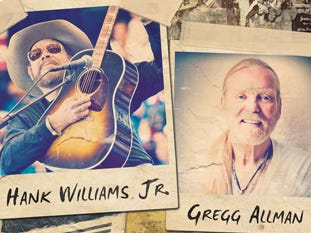
WHAT :: Hank Williams Jr. and Gregg Allman WHERE :: Pensacola Bay Center WHEN :: Friday, July 12 at 8:00pm ONSALE :: Friday, May 17 at 12:00pm PRICES :: $48, $59 and $69 TICKETS :: Ticketmaster.com, 800-745-3000, Pensacola Bay Center Box Office, all Ticketmaster outlets __________________________________________________________________________________ ABOUT HANK WILLIAMS JR. Williams began his career by following in his famed father's footsteps, singing his father's songs and imitating his father's style. Williams's own style slowly evolved as he struggled to find his own voice and place within the country music industry. This trend was interrupted by a near-fatal fall off the side of Ajax Mountain in Montana on August 8, 1975. After an extended recovery, he challenged the country music establishment with a blend of country, rock, and blues. Williams enjoyed much success in the 1980s, from which he earned considerable recognition and popularity both inside and outside the country music industry. In 1988, he released a Southern pride song, "If the South Woulda Won". The reference is to a Southern victory in the Civil War. The song proposes Southern holidays, honoring Elvis Presley, Lynyrd Skynyrd, and Patsy Cline. Hank Williams Jr. would run for president of the South. He would place the capital in Montgomery, Alabama, honoring his father, Hank Williams Sr., with his image on the $100 bill. He also implies that in the current United States drug dealers are not prosecuted and killers get off free and calls for swift executions instead. His 1989 hit "There's a Tear in My Beer" was a duet with his father created using electronic merging technology. The song was written by his father, and had been previously recorded with Hank Williams playing the guitar as the sole instrument. The music video for the song combined existing television footage of Hank Williams performing, onto which electronic merging technology impressed the recordings of Hank Jr., which then made it appear as if he were actually playing with his father. The video was both a critical and commercial success. It was named Video of the Year by both the Country Music Association and the Academy of Country Music. Hank Williams Jr. would go on to win a Grammy Award in 1990 for Best Country Vocal Collaboration. He is well known for his hit "A Country Boy Can Survive" and as the performer of the theme song for Monday Night Football, based on his 1984 hit "All My Rowdy Friends Are Coming Over Tonight". In 1991, 1992, 1993, and 1994, Williams's opening themes for Monday Night Football earned him four Emmy Awards. In 2001, Hank rewrote his classic hit "A Country Boy Can Survive" after 9/11, renaming it "America Can Survive". In 2004, Williams was featured prominently on CMT Outlaws. In 2006, he starred at the Summerfest concert. He has also made a cameo appearance along with Larry the Cable Guy, Kid Rock, and Charlie Daniels in Gretchen Wilson's music video for the song "All Jacked Up". He and Kid Rock also appeared in Wilson's "Redneck Woman" video. Hank also had a small part of Kid Rock's video "Only God Knows Why". He is also referenced in numerous songs by modern-day country singers, including Kid Rock, Brantley Gilbert, Gretchen Wilson, Alan Jackson, Justin Moore, Trace Adkins, and Aaron Lewis. In April 2009, Williams released a new single, "Red, White & Pink-Slip Blues", which charted to number 3 on the country charts. The song was the lead-off single to Williams's album 127 Rose Avenue. The album debuted and peaked at number 7 on the Billboard Top Country Albums chart. Also in July 2009, 127 Rose Avenue was announced as his last album for Curb Records. ABOUT GREGG ALLMAN After the death of Duane Allman in 1971, Gregg Allman started out on a solo career. His first album, Laid Back, was released in 1973 to a positive critical reception. It included a couple of reworked Allman Brothers songs, such as a horn-infused version of "Midnight Rider" that made it to #19 on the Billboard Hot 100 singles chart, and originals like "Queen of Hearts", the other ABB members felt did not quite fit the Allman Brothers sound. Gregg also covered a traditional gospel song "Will the Circle Be Unbroken?" and former California roommate Jackson Browne's song "These Days." His solo career has continued intermittently throughout the subsequent decades, sometimes touring when the Allman Brothers Band is off the road. Generally, these solo efforts – first with the Gregg Allman Band, and later with Gregg Allman & Friends – eschew lengthy guitar solos and cast Allman more in the mode of his favorite soul singers. The bands often include a horn section and are more groove-oriented, mixing original songs with reworked Allman Brothers songs and covers of blues, R&B, and soul songs. Allman's second chart single came in 1987 with the #49 peaking "I'm No Angel", from the album of the same name. The album went on to be certified Gold for 500,000 copies sold and led to a renewed interest in Allman and to a reformation of the Allman Brothers Band less than three years later. His solo album, Low Country Blues, was produced by T-Bone Burnett and issued in early 2011. It is a collection of eleven blues standards and one new song written by him. The album was nominated as the Best Blues Album for the 2011 Grammy Awards. He has also made guest appearances on albums and concert videos by a wide variety of other artists, including a concert DVD celebrating the twenty-fifth anniversary of The Radiators, playing Midnight Rider with that band. In addition to his musical career, Allman took acting roles in the films Rush Week (1989) and Rush (1991), and in episodes of the TV series Superboy. He also had a brief speaking cameo in the Family Guy episode "Let's Go to the Hop".
This article originally appeared on Santa Rosa Press Gazette: Hank Williams Jr. and Gregg Allman Coming to Pensacola
